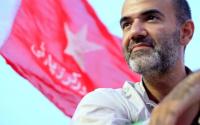Published on Tuesday, September 23, 2003 by the Boston Globeby Thomas Oliphant
Give or take a couple of nouns -- "bribery" and "fraud," to be precise -- here are the facts behind what Senator Edward Kennedy had to say last week about the mess in Iraq.The secrecy surrounding the way President Bush is spending military billions appears to have a purpose, one that has nothing to do with keeping valuable intelligence from our enemies. In addition to keeping secret the actual expenditures for specific activities, the president is also keeping secret the precise destinations of the dollars, one of which just happens to be the treasuries of other countries. One example is the "international" division of troops on the scene, nominally led by the Poles. As far as anyone can determine, not a dime of the costs associated with this division's presence in Iraq is being paid for by any of the countries participating in it. The United States is paying all the freight, and those troops would not be in Iraq -- their governments would not have sent them -- if it weren't.
Take another, more troubling example. Over the weekend, the Bush administration signed papers for an $8.5 billion package of loans and other goodies for Turkey -- the country that stiffed us on the eve of the invasion of Iraq, eliminating the possibility of an attack from the north. This package is a cousin to earlier attempts to use grants, loans, and other economic concessions to get Turkey into Iraq -- which is a dangerous idea even on its merits, given Turkey's miserable record vis a vis the Kurds.
In announcing that the package had been finalized, triggering a Turkish Cabinet meeting to consider sending forces into Iraq, Treasury Secretary John Snow denied that the package of goodies was explicitly conditioned on Turkey's joining America's band of bought-and-paid-for allies. However, he did acknowledge that it assumed Turkey's "cooperation" on Iraq matters -- a distinction too cute for hacks like me.
This raises an interesting question. Just what do you call a payment of money to a government in return for its performance of an act like sending troops to Iraq that it would not perform but for the payment of the money? Those who call it bribery may be accused of being accurate and tough but hardly inaccurate and not at all "uncivil" (to use President Bush's complaining adjective).
As Kennedy said in his Boston interview last week with the Associated Press, the diligent folks at the Congressional Budget Office have encountered nothing but roadblocks in attempting to track Bush's military money and do not accept the administration's rough estimate of the ongoing costs: nearly $4 billion a month.
Kennedy was referring to a CBO report earlier this month summarizing its efforts to get at the truth. It included this sentence: "CBO believes that the $3.9 billion figure may include some one-time costs that CBO would not incorporate in its estimate of the costs of long-term occupation."
I'm told that was in part a reference to these payments for other countries that meet all the dictionary tests of bribery.
As for the war itself, consider the facts again. The president chose March 20 as an invasion date arbitrarily, not for any reasons involving a threat to our nation that demanded an attack then, much less an attack with only Britain as a major ally. Just as arbitrarily, he chose to justify the date on the basis of supposed threats from Iraq's alleged weapons of mass destruction and "ties" to the terrorists who attacked the United States two years ago.
As the facts have unfolded in ways that make these claims, shall we say, spurious, other justifications have emerged after the fact (transforming the entire Middle East, stopping a human rights violator from his murderous ways). This is the substitution of one bill of goods with another bill of goods. The old bait-and-switch is one of the classic elements of what is called fraud with legal precision.
And lest anyone be shocked at the suggestion by Kennedy that politics was involved in all this, I invite a reading of White House guru Karl Rove's intemperate speech to the Republican National Committee early in 2002 and the subsequent use of "national security" and morphed images of Saddam Hussein to question the loyalty of Democrats in that year's ugly congressional campaigns.
Such political habits die hard -- hence Tom DeLay's reaction to Kennedy, accusing him of attacking Bush with more verve than he ever used against Saddam Hussein, or Attorney General Ashcroft's repeated equation of opposition to the Patriot Act with subversion.
Like nearly all Democrats, Kennedy is prepared to support more money for Iraq, possibly even to support something like the $87 billion Bush has requested.
The essential precondition for all this money, however, is the truth. Kennedy raised a lot of eyebrows with some tough language, but unlike the president he had the facts behind him. Instead of complaining about language, Bush would be wiser to realize that the truth about bribery and an end to the fraud would be much more productive.






